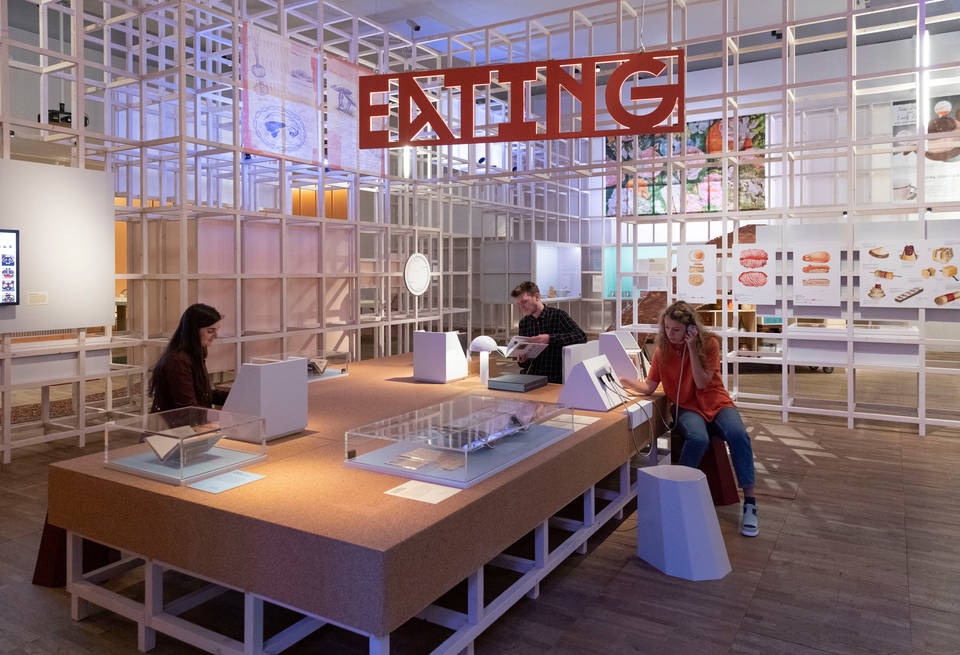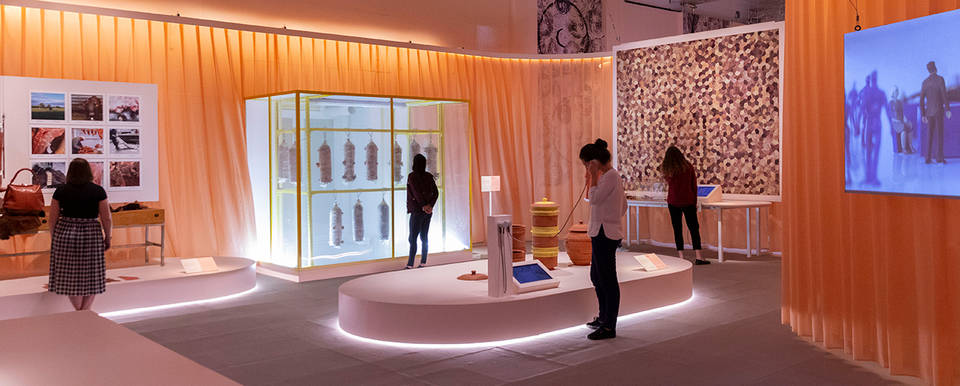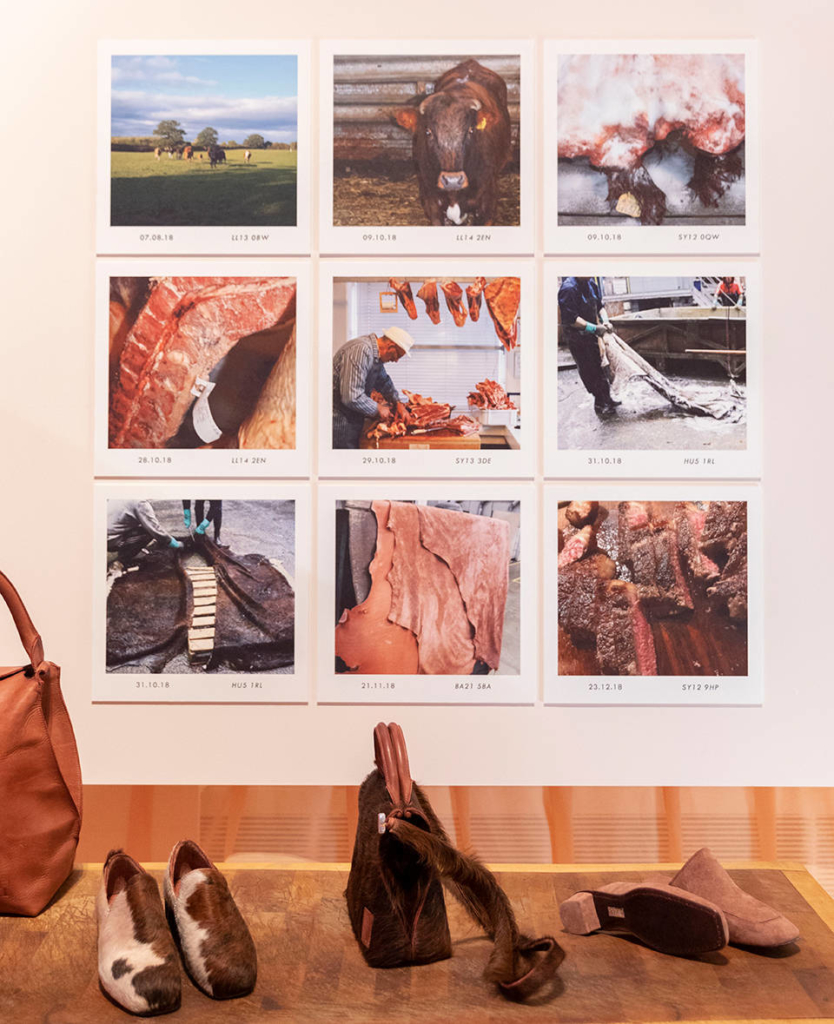MARTA BIINO considers the sustainability of food consumption and waste production.
Addressing social and environmental issues is a growing trend in the contemporary art world. And yet, it is still uncommon to see an exhibition confronting one of the most pressing issues of our time: the problem of unsustainable food production and waste disposal. Food: Bigger than the Plate, hosted by the V&A, presents itself as a journey through the history of Western food consumption and waste production. The visitor is immersed in a four-step itinerary: composting, farming, selling and eating. Each section is conceived to uncover the inherent unsustainability of the contemporary food industry while focusing on the importance of promptly undertaking major changes.
The exhibition starts off with a simple, often unacknowledged reality: human activity produces waste. Every action we undertake contributes to a polluting process that’s slowly destroying our planet. According to statistical estimations, every year the average British citizen produces one tonne of waste and not even half of it goes to recycling. It sounds astonishing, but it is the reality we have been living with for a long time – arguably too long.. If we don’t take radical measures imminently , the survival of mankind is at serious risk.
Unexpectedly, the approach of Food: Bigger than the Plate is not at all tragic. It’s a colourful, empowering display with a rather optimistic message. Hope is not all lost, the apocalypse is not approaching (yet), the seemingly irreversible regress of our planet can still be turned into progress. We are thus presented with an impressive number of projects and ideas aimed at reusing, recycling and reshaping the way we conceive waste.

You can browse products such as reusable coffee cups made from coffee grounds, or compostable accessories made out of a material totally indistinguishable from plastic, which you can feel for yourself at the exhibition. Even more impressive is the natural fabric made from recycled orange peels, a quasi-perfect dupe of acrylic. Some works are intended to reach a wider scope, like the ‘Daily Dump’: a home composting system for kitchen waste to be introduced in Bangalore, India, where rubbish scavenging on the streets is still one of the most pressing social issues.
The convenience of these ideas, seemingly so simple to implement, raise questions as to why they haven’t been introduced to the market yet. We could be saving tonnes of carbon and energy by employing more sustainable materials. The issue preventing this switch to alternative materials is our traditional approach to the production of food and the handling of waste, which has been a part of our culture for centuries. These processes are deep-rooted in our infrastructure and when they were first introduced, the idea of sustainability was not even in the picture. While undoubtedly convenient, they are now proving to be increasingly inefficient for the environment. As Mike Berners-Lee infamously stated, there is no planet B, and it is time we start taking better care of it. We are therefore faced with an urgent challenge: finding new ways of connecting people with food efficiently.
If we collectively made every decision around eating and composting with consideration for issues of the environment, these decisions could have the power to shape the world. It’s not easy: the comfort of never having to compromise what we eat is deeply entrenched in our society. Since the 19th century, we have grown used to the perennial availability of every food item we desire, at all times. Nowadays, it’s impossible to conceive that we may not be able to eat tomatoes in the winter, even though tomatoes are a summer fruit.

If we were made aware of the journeys undertaken by the fruits and vegetables available in our supermarkets every day, we’d be astonished at the amount of fresh produce that doesn’t belong in those aisles. That’s what two Icelandic designers tried to reveal with their “Banana Story”: they tracked the journey of a single banana from Ecuador to their home country. The result was incredible; the fruit we so easily take for granted travels roughly 8800 km in 14 days, crossing multiple country borders, before it is displayed in a supermarket. Moreover, the majority of the fruit is discarded and never sold, labeled inappropriate due to imperfections, discoloration or malformation. This process is not only expensive in terms of money and energy, but also wasteful and unnatural.
Therefore, our collective effort has to be directed towards a re-imagining of the way we access and consume food. More sustainable technologies, liveable cities, empowered communities and flavourful dishes are all on the table.
More simply, we need to rebuild our relationship with nature. The global trend of urbanisation, with the consequent decrease of work on land, has reduced agriculture and farming to a backdrop in our lives. In the UK, only 1.5% of the workforce is employed in the agricultural sector. Food production appears remote and detached from our everyday lives, and sustainability levels in food production are completely ignored. However, the Earth’s tolerance to the extreme exploitation of its resources is coming to an end: as consumers, we also have to be aware of the way that food is produced, and its impact on the natural world.
It’s enough to start small: check “made-in” labels in order to direct your focus towards local and seasonal produce, dispose of waste carefully, and avoid plastic-packaged foods whenever possible. Globally, it’s a daunting task to undertake, as the issue is still largely ignored by many governments. This, however, is the key to the success of Food: Bigger than the Plate: it raises awareness on a pressing problem, combining the informative with the entertaining. It’s not catastrophic or pessimistic, but it is peremptory: our attitude to food and waste needs to change. We have the power to make the rules. Now, this power has to be employed for the greater good of our planet. Time is running out, so we better get down to business.

Featured image courtesy of vam.ac.uk.





